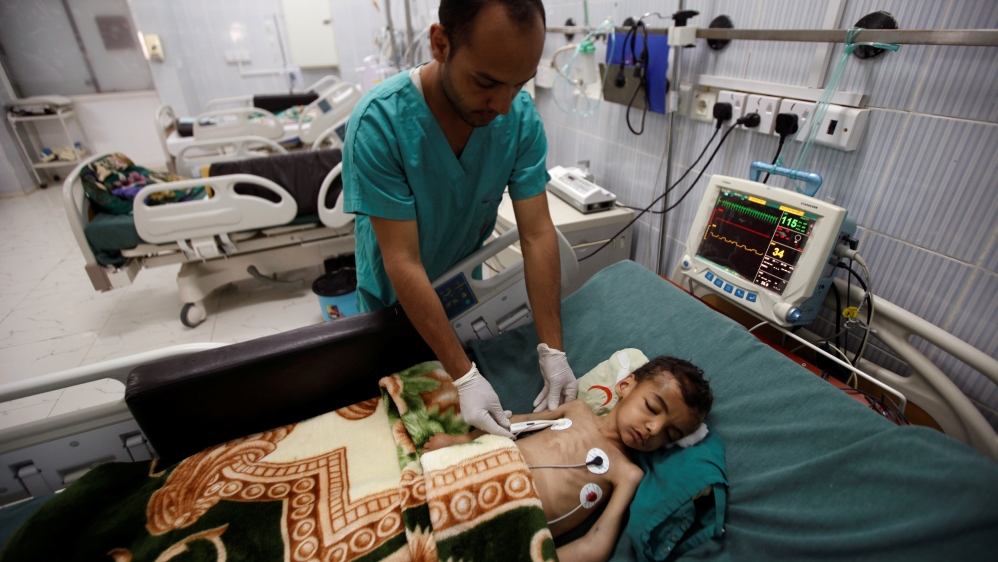On 21st November 2018, Al Jazeera released a report stating that since the Yemen War started, 85,000 children may have died from starvation. This is but one of the reports which gives an insight into the horrific conditions in Yemen. A crisis which is considered to be the largest humanitarian crisis today.
The Special Envoy for the Secretary-General for Yemen proudly announced that the situation in Yemen has never received so much ‘international attention’, that it no longer needs to be referred to as ‘the forgotten war’. But what difference does international attention make? It hasn’t brought about change or solved the situation. People are dying, unable to access the aid that they desperately need, unable to get the medical assistance that they desperately need.
All of this is happening as the United Nations announces it has managed to bring the parties involved in the crisis to the negotiation table. The people of Yemen are enduring horrific circumstances. In response, the United Nations, an organization which vowed to protect humanity from the ‘scourge of war’, is simply trying to negotiate with the people who are launching air strikes, airstrikes which the United Nations accepts is the cause of thousands of deaths. For them it’s enough to negotiate with the very parties who are behind the deaths of approximately 130 children every day (Save The Children).
Is this truly an achievement? And if it is all that the victims of the Yemen War can hope for, isn’t it time to realize how truly flawed the current system is?
The advocates of the Western system will argue that there is a limit to what the United Nations can do, citing several liberal concepts such as state sovereignty, as if that is a suitable excuse for allowing the deaths of hundreds of thousands of people.
The efforts for the ceasefire stalled. The efforts to send aid is limited due to the political situation in the country. A situation which is caused by the involvement of 11 countries, including Saudi Arabia. The US, France and UK are suppling the warplanes, intelligence and the munitions to the Saudi air force, allowing for the death of 2/3 of the civilian deaths (The United Nations High Commissioner for Human Rights). The US government is also launching airstrikes on Yemen, and have admitted to having deployed troops on the ground.
Why is this relevant? Well, the US, UK and France are members of the United Nations Security council. A council which is effectively the most powerful body in the United Nations, which has had the power to stop several conflicts since it’s establishment in 1945 but hasn’t due to their strategic interest. Yemen is an area of strategic interest as it is an important link to the world’s oil shipment pass.
The United Kingdom, a permanent member of the United Nations Security Council, has recently brought the situation in Yemen before the Security Council, circulating a resolution amongst the 14 other members. According to the CBS News, this resolution calls for the cessation of the hostilities for areas around the Port of Hodeida and calls for the removal of barriers to the delivery of humanitarian aid. It also calls of the parties involved in the war to cease all attacks on densely populated civilian areas across Yemen and to cease all missile and UAV attacks against regional countries and maritime areas.
However, according to the Guardian, it is still unclear when the vote for the resolution will take place or what the member states will do. It is also important to realize that the resolution simply aims to ‘pave the way’ to ‘talks’ and that it is a short-term measure, with the cease fire being applicable for two- horrifically short weeks.
What’s ridiculous is that these talks were said to have stalled following the Saudi Prince expressing his discontent at the conditions. The international community has accepted that Saudi will demand that the amendments be made to the resolution before they will consider accepting it. These ‘talks will delay the aid which the Yemeni population is in desperate need of. According to the BBC, approximately 17.8 million people do not know where their next meal is coming from and 8.4 million are considered at risk of starvation. Severe acute malnutrition is threatening the lives of almost 400,000 children under the age of five.
Why are the interests of one country being used as an excuse to stop the crisis in Yemen? The answer is simple, the financial interests of the international community overweighs the lives of the hundreds of thousands of people suffering in Yemen. The United States and United Kingdom are amongst the largest exporters of arms to the Middle East, the Saudi government is the 2nd largest importer of those exports. The UK and USA are joined by Russia, France and China in being the largest arms exporters in the world (the Guardian).
These statistics are important to keep in mind, as these states are the ones with the power to supposedly bring change in the Western world. These statistics and the reality of the crisis across the Muslim World, including Yemen, is testament to the fact that the use of this power is determined by their financial and strategic interests. As such, people need to understand that whether or not, the vote takes place nothing will change. The system is being run by the very states that are benefiting from it.
We need to change the system; rid the world of the United Nations who act as a front for state interests and create an illusion that the Western states have any interest in protecting humanity.
إِنَّ اللهَ لَا يُغَيِّرُ مَا بِقَوْمٍ حَتَّى يُغَيِّرُوا مَا بِأَنْفُسِهِمْ
“Allah will not change the condition of a people until they change what is in themselves.”
[Al-Rad: 11]
Fatima Musab
Member of the Central Media Office of Hizb ut Tahrir

